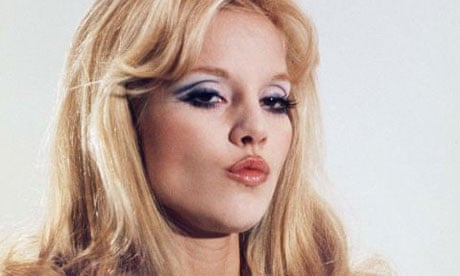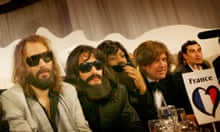Although the two nations are separated by little more than 30 miles of water, the gulf between the French music industry and British hearts has seemed unbridgeable at times. For many Anglophone critics, French pop was a joke – superannuated grandes dames in chintzy dresses belting out chintzier ballads and moustachioed men in tight white suits desperately trying to convince themselves they were the second Elvis. French rock wasn't treated so kindly. The party line seemed to be that the country could have shut up shop after Serge Gainsbourg released Histoire de Melody Nelson without the rest of the world missing out on anything.
That such myths were common currency, at least until the emergence of Daft Punk and Air, is remarkable given all the evidence to the contrary. French law demands a high proportion of songs on French radio in the national language. This might have hampered commercial success in English-speaking markets, but it has helped to maintain a domestic music scene that is one of the strongest and most diverse in Europe. To celebrate French music at its best, here are 10 clips from the archives.
Sylvie Vartan – Par Amour, Par Pitié (1966)
Despite the frothy image of acts such as France Gall and Jacqueline Taïeb, the 1960s weren't all miniskirts and bubblegum. The darker side of pop-chanson was rarely articulated with such gut-wrenching power as on Sylvie Vartan's Par Amour, Par Pitié. Pleading for a departed lover to return, out of pity if not love, she requests the same mercy a vet would show in putting a wounded horse out of its misery. It would be difficult to find a bleaker sentiment in the pop canon, even with the best efforts of the current generation of singers from the nouvelle scène française following in her footsteps.
Brigitte Bardot – Contact (1968)
Music so forward-thinking it still sounded futuristic when Stereolab started imitating it three decades later, Contact marked the high point of Brigitte Bardot's pop career and ranks alongside the very best work Serge Gainsbourg ever produced. Accompanied by clanking, whirring loops, Bardot spits out lyrics about meteorites and space suits like an angry Barbarella. It's fitting that one of the most electrifying songs of the 1960s was performed by a star whose raw vivacity revolutionised the world's image of France.
Nicoletta – A Quoi Sert de Vivre Libre (1975)
It was almost inevitable that chanson, seen by some as France's indigenous version of soul music, would be influenced by the lush Philly sound that came to dominate the US in the early 70s. Replacing the sweet falsetto of the original with an earthy growl, Nicoletta's cover of the Stylistics' Can't Give You Anything (But My Love) brought the two together magnificently. The song foreshadowed the glorious rise of French disco-pop that saw the likes of Dalida, Sheila & B Devotion, Patrick Hernandez and Santa Esmeralda conquer the European charts.
Cerrone – Supernature (1977)
Having mastered disco, French producers set about dismantling it and rebuilding the genre in remarkable new configurations. Alongside Space's Magic Fly, the stunning Supernature by Cerrone was instrumental in shaping the next 30 years of dance music, inspiring everything from the glittering house of Cassius and Daft Punk to David Guetta. Over swirling synths, the apocalyptic lyrics tell of mutant creatures wreaking a terrible revenge on humanity for its environmental crimes. Goldfrapp named their finest album in its honour.
Elli et Jacno – Main dans la Main (1980)
Rising from the ashes of punk legends Stinky Toys, Elli et Jacno played stripped-down synth-pop that demonstrated you could take electronic music into the charts even if you weren't able to recite the instruction manuals of obscure analogue keyboards from memory. Rarely sounding as if they required more than one finger to play, songs such as Main dans la Main were critical to the development of a DIY pop scene that has continued to produce some of France's most exciting acts, including reigning electro queen Yelle.
Étienne Daho – Week-End à Rome (1984)
From Charles Trenet's Route Nationale N°7 onwards, Parisian singers have frequently returned to the theme of escaping the city the rest of the world is infatuated with. Daho brought a heavy measure of Trenet's unruffled old-world charm to electronic pop in the early 1980s, a suave, sardonic voice in an otherwise frenetic era. Week-End à Rome saw him flee France's rainy capital, in the company of Belgian starlet Lio, for two days of romance across the Italian border.
Indochine – 3e Sexe (1985)
By 1985, the French new wave was in full swing, bringing drum machines and gender fluidity to a rock scene crying out for rejuvenation. Snarling, propulsive jangle-pop equal to anything the Cure were releasing on the other side of the Channel, Indochine's 3e Sexe captured the spirit of the times. Together with Les Rita Mitsouko and Niagara, they're one of the few French bands to have consistently competed with the country's biggest solo artists.
Mylène Farmer – Désenchantée (1991)
The signature song of Europe's greatest modern pop star, Désenchantée topped the charts for nine consecutive weeks in 1991. Although private to the point of reclusiveness, Farmer's life and work have always been intensely scrutinised by critics applying the auteur theory to commercial music. It's an approach dissenters have argued has kept the French industry in stasis while the rest of the world has moved on to the more immediate pleasures of precision-engineered assembly-line pop. France may never produce a Girls Aloud but it is just as unlikely Cheryl Cole will ever record a million-selling single with lyrics channelling Romanian philosopher Emil Cioran.
Air – La Femme D'Argent (1998)
Familiar to anyone who caught three minutes of a BBC home improvement programme between 1998 and 2006; Air's La Femme D'Argent deserves to be remembered as more than backing music for grasping buy-to-letters replacing their lawns with decking. Chill-out may be the two most offputting words in the electro lexicon (after "featuring Skrillex"), but the song's sprawling beauty is absolutely undeniable. With "(French Band)" proudly displayed in parentheses on their record sleeves, Air shattered stereotypes about the country's pop and cleared a path to British critical acclaim that the likes of Phoenix and Charlotte Gainsbourg have followed.
Raï'n'B Fever – Un Gaou à Oran (2004)
The street sounds of Africa have always found a home in Paris and there are few better examples of the city's cultural cross-pollination than 2004's Raï'n'B Fever project. Bringing Algerian-born raï singer Mohamed Lamine and Ivorian zouglou superstars Magic System together with local rappers 113, Un Gaou à Oran showed the new face of French pop at its dynamic best. With a take on banlieue life more heavily indebted to Benny Hill than La Haine, the accompanying video gave international audiences a rare chance to see the suburban tower blocks as communities bubbling with life, rather than crumbling monuments to deprivation and inequality.




Comments (…)
Sign in or create your Guardian account to join the discussion